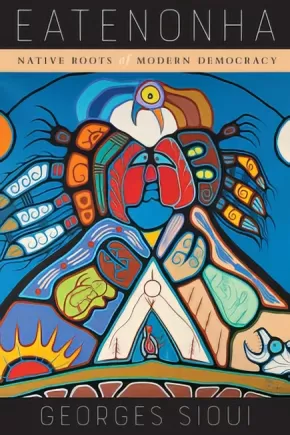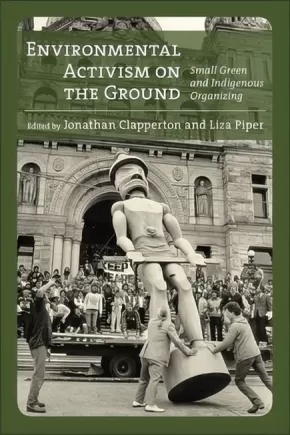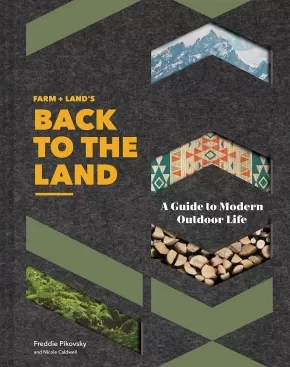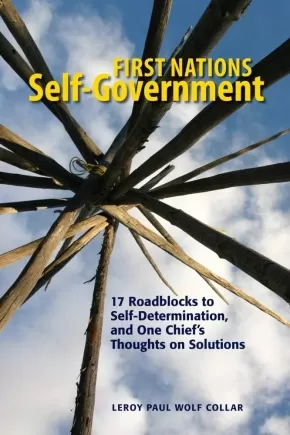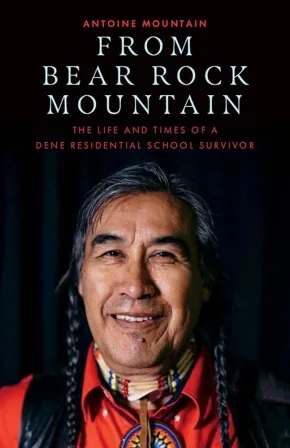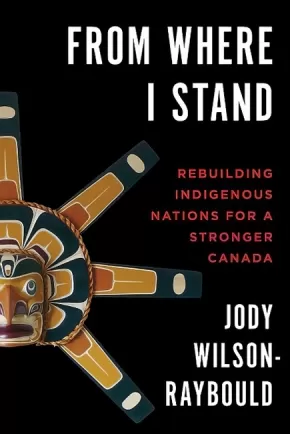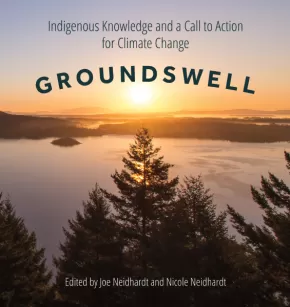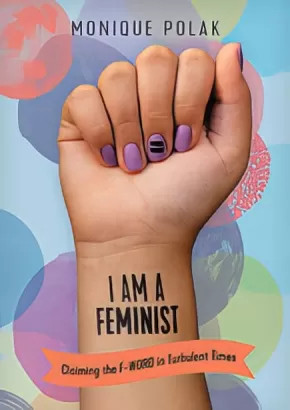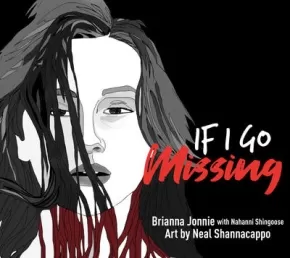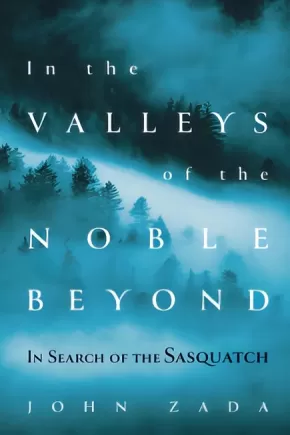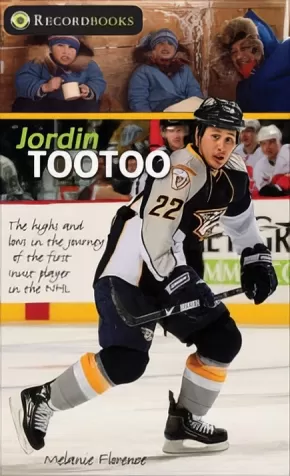
Non-Fiction
361
-
375
of
748 Results;
Sort By
Go To
of 50
Eatenonha: Native Roots of Modern Democracy
$39.95
Format:
Hardcover
Text Content Territories:
Indigenous Canadian; First Nations; Huron-Wendat (Ouendat); Seawi Clan;
ISBN / Barcode: 9780773556393
Synopsis:
Synopsis:
An exploration of the historical and future significance of Canada's Native soul.
Eatenonha is the Wendat word for love and respect for the Earth and Mother Nature. For many Native peoples and newcomers to North America, Canada is a motherland, an Eatenonha - a land in which all can and should feel included, valued, and celebrated.
In Eatenonha Georges Sioui presents the history of a group of Wendat known as the Seawi Clan and reveals the deepest, most honoured secrets possessed by his people, by all people who are Indigenous, and by those who understand and respect Indigenous ways of thinking and living. Providing a glimpse into the lives, ideology, and work of his family and ancestors, Sioui weaves a tale of the Wendat's sparsely documented historical trajectory and his family's experiences on a reserve. Through an original retelling of the Indigenous commercial and social networks that existed in the northeast before European contact, the author explains that the Wendat Confederacy was at the geopolitical centre of a commonwealth based on peace, trade, and reciprocity. This network, he argues, was a true democracy, where all beings of all natures were equally valued and respected and where women kept their place at the centre of their families and communities.
Identifying Canada's first civilizations as the originators of modern democracy, Eatenonha represents a continuing quest to heal and educate all peoples through an Indigenous way of comprehending life and the world.
Reviews
"Eatenonha is a unique interweaving of self, family, First Nation, and Indigenous peoples of the Americas and elsewhere." - John Steckley, Humber College
Educator Information
Recommended in the Canadian Indigenous Books for Schools 2020/2021 resource list for grades 10 to 12 for use in these areas: English Language Arts and Social Studies.
Additional Information
200 pages | 6.00" x 9.00"
Environmental Activism on the Ground: Small Green and Indigenous Organizing
$39.99
Editors:
Format:
Paperback
Text Content Territories:
Indigenous American; Indigenous Canadian;
Grade Levels: 12; University/College;
ISBN / Barcode: 9781773850047
Synopsis:
Synopsis:
Environmental Activism on the Ground draws upon a wide range of interdisciplinary scholarship to examine small scale, local environmental activism, paying particular attention to Indigenous experiences. It illuminates the questions that are central to the ongoing evolution of the environmental movement while reappraising the history and character of late twentieth and early twenty-first environmentalism in Canada, the United States, and beyond.
This collection considers the different ways in which Indigenous and non-Indigenous activists have worked to achieve significant change. It examines attempts to resist exploitative and damaging resource developments, and the establishment of parks, heritage sites, and protected areas that recognize the indivisibility of cultural and natural resources. It pays special attention to the thriving environmentalism of the 1960s through the 1980s, an era which saw the rise of major organizations such as Greenpeace along with the flourishing of local and community-based environmental activism.
Environmental Activism on the Ground emphasizes the effects of local and Indigenous activism, offering lessons and directions from the ground up. It demonstrates that the modern environmental movement has been as much a small-scale, ordinary activity as a large-scale, elite one.
Reviews
"Environmental Activism on the Ground succeeds splendidly in complicating and enriching our understanding of modern environmentalism. Focusing on Indigenous and non-Indigenous activists in an impressive range of settings, Jonathan Clapperton and Liza Piper draw together and interpret diverse methodological and conceptual insights in a way that gives new, deserved prominence to those who have strived—and continue to strive—for environmental justice at the local level. These accounts left me both enlightened and heartened. Scholars from across the humanities and social sciences will welcome this volume." - Richard A. Rajala, Department of History, University of Victoria.
Educator Information
Table of Contents:
Illustrations
Acknowledgments
Introduction: In the Shadow of the Green Giants: Environmentalism and Civic Engagements - Jonathan Clappeton & Liza Piper
Part 1: Processes and Possibilities
1. Strategies for Survival: First Nations Encounters with Environmentalism - Anna J. Willow
2. Native/Non-Native Alliances: Challenging Fossil Fuel Industry Shipping at Pacific Northwest Ports - Zoltán Grossman
3. Conserving Contested Ground: Soverigenty-Driven Stewardship by the White Mountain Apache Tribe and the Fort Apache Heritage Foundation - Jon R. Welch
4. From Southern Alberta to Northern Brazil: Indigenous Conservation and the Preservation of Cultural Resources - Sterling Evans
5. Parks For and By the People: Acknowledging Ordinary People in the Formation, Protection, and Use of State and Provincial Parks - Jesica M. DeWitt
Part 2: Histories
6. Alternatives: Environmental and Indigenous Activism in the 1970s - Liza Piper
7. Marmion Lake Generating Station: Another Northern Scandal? - Tobasonakwut Peter Kinew
8. Environmental Activism as Anti-Conquest: The Nuu-chah-nulth and Environmentalists in the Contact Zone of Clayoquont Sound - Jonathan Clapperton
9. Local Economic Independence as Environmentalism: Nova Scotia in the 1970s - Mark Leeming
10. “Not an Easy Thing to Implement”: The Conservation Council of New Brunswick and Environmental Organization in a Resource-Dependent Province, 1969-1983 - Mark J. McLaughlin
11. The Ebb and Flow of Local Environmental Activism: The Society for Pollution and Environmental Control (SPEC), British Columbia - Jonathan Clapperton
12: From Scoieal Movement to Environmental Behemoth: How Greenpeace Got Big - Frank Zelko
Afterword: Lessons from the Ground Up - Jonathan Clapperton & Liza Piper
Bibliography
List of Contributors
Index
Additional Information
752 pages | 6.00" x 9.00"
Authenticity Note: Because this work includes contributions from Indigenous peoples, it has been labelled as containing Authentic Indigenous Text.
FARM + LAND'S Back to the Land: A Guide to Modern Outdoor Life
$44.95
Format:
Hardcover
ISBN / Barcode: 9781452173337
Synopsis:
Synopsis:
FARM + LAND'S Back to the Land: A Modern Guide to Outdoor Life is a collection of stories about slow living, sustainability, and the value of doing things with your own two hands.
This gorgeous book features remarkable narratives, essential how-tos, and hundreds of breathtaking photographs from people who have embraced lives of adventure in wild places.
With gorgeous photography, engaging stories, practical tips, and useful illustrations, this book offers an escape into a world of simple pleasures, contentment, and a rural way of life.
- Focuses on the back-to-the-land movement
- A visually driven celebration of cozy homes and wild landscapes
- Embraces life's simple and enduring pleasures
FARM + LAND'S Back to the Land: A Modern Guide to Outdoor Life features places like a spectacular treehouse suspended above a lush forest, a cozy cabin perched on a mountainside, and a small farm growing heirloom vegetables in the high desert.
This book is a must-have for outdoor enthusiasts and anyone who has ever dreamed of escaping to a simpler way of life.
- Delivered in a highly giftable and handsome volume that inspires feelings of wanderlust.
- The perfect gift for Father's Day and the holidays, as well as for outdoors enthusiasts, travel lovers, camping fans, and readers of Dwell, Modern Farmer, and Kinfolk.
- Includes information on homesteading and outdoor skills such as how to build a desert vegetable garden; how to cut, split, and stack firewood; how to build a wood-fired hot tub; how to raise chickens and honeybees; how to make essential oils; and more!
Additional Information
272 pages | 7.65" x 9.60" | 350 full-colour photographs
First Nations Self-Government: 17 Roadblocks, and One Chief's Thoughts on Solutions
$24.95
Format:
Paperback
Text Content Territories:
Indigenous Canadian; First Nations; Blackfoot Confederacy (Siksikaitsitapi); Siksika (Blackfoot);
Grade Levels: University/College;
ISBN / Barcode: 9781550598216
Synopsis:
Synopsis:
Indigenous Peoples in Canada are continuing to assert their right to self-determination in this era of reconciliation. While dozens of Indigenous communities have signed varying forms of self-government agreements with the federal government, Indigenous Nations still face many obstacles along the path to true self-determination.
As a former Chief of Siksika Nation in southern Alberta, Leroy Wolf Collar dealt with many of the same problems other Indigenous Nations face across the country. From serious housing shortages to the lack of opportunities for youth, Chief Wolf Collar experienced the challenges and frustrations that come from operating in a colonial system still constrained by the Indian Act.
How do Indigenous Peoples move on from this defective system? Chief Wolf Collar identifies 17 issues that currently hinder Indigenous Nations—including broken treaty promises, problems with common forms of band administration, and the intrusion of provincial governments—along with potential solutions to overcome them.
This guide is for current and aspiring Indigenous leaders who want to increase their understanding of good governance, management, and leadership, as well as those who want to explore issues around Indigenous self-determination in Canada.
Educator Information
Recommended in the Canadian Indigenous Books for Schools 2020/2021 resource list for grades 11 and 12 for use in these areas: Law, English Language Arts, and Social Studies.
Additional Information
128 pages | 6.00" x 9.00"
Freedom of Expression: Deal with it before you are censored
$24.95
Artists:
Format:
Hardcover
ISBN / Barcode: 9781459413931
Synopsis:
Synopsis:
Can you say anything you want? Should you?
Everyone has rights but navigating your rights can be difficult. You have the right to freedom of expression but there are many places where this freedom is limited by laws, rules and regulations, or even customs such as good manners.
By exploring the viewpoints of The Censor, The Speechmaker and The Witness, this book will help you navigate issues of how to express identity and opinion.
- Freedom of Expression 101 defines rights, freedom of expression and censorship
- Dear Conflict Counsellor offers real-life problems and solutions
- Quizzes test your ability to identify censorship and how to deal with issues around freedom of expression
- A resource guide puts helpful organizations, books and websites at your fingertips
Educator & Series Information
The Deal With It series helps adolescents cope with conflicts in everyday life and promote peaceful homes, schools, and communities.
Recommended Ages: 9-14
Fry Reading Level [grade]: 5.4
Lexile Reading Level: 800L
Additional Information
32 pages | 8.50" x 11.00"
From Bear Rock Mountain: The Life and Times of a Dene Residential School Survivor
$30.00
Format:
Hardcover
Text Content Territories:
Indigenous Canadian; First Nations; Dene;
ISBN / Barcode: 9781927366806
Synopsis:
Synopsis:
In this poetic, poignant memoir, Dene artist and social activist Antoine Mountain paints an unforgettable picture of his journey from residential school to art school—and his path to healing.
In 1949, Antoine Mountain was born on the land near Radelie Koe, Fort Good Hope, Northwest Territories. At the tender age of seven, he was stolen away from his home and sent to a residential school—run by the Roman Catholic Church in collusion with the Government of Canada—three hundred kilometres away. Over the next twelve years, the three residential schools Mountain was forced to attend systematically worked to erase his language and culture, the very roots of his identity.
While reconnecting to that which had been taken from him, he had a disturbing and painful revelation of the bitter depths of colonialism and its legacy of cultural genocide. Canada has its own holocaust, Mountain argues.
As a celebrated artist and social activist today, Mountain shares this moving, personal story of healing and the reclamation of his Dene identity.
Educator Information
Recommended in the Canadian Indigenous Books for Schools 2019-2020 resource list as being useful for grades 9 to 12 in the following subject areas: English Language Arts, Social Studies.
Included in this story are personal stories of residential school and addiction.
Additional Information
272 pages | 5.50" x 8.50"
From Where I Stand: Rebuilding Indigenous Nations for a Stronger Canada
$24.95
Format:
Paperback
Text Content Territories:
Indigenous Canadian;
Grade Levels: 12; University/College;
ISBN / Barcode: 9780774880534
Synopsis:
Synopsis:
An Indigenous leader who has dedicated her life to Indigenous Rights, Jody Wilson-Raybould has represented both First Nations and the Crown at the highest levels. And she is not afraid to give Canadians what they need most – straight talk on what has to be done to deconstruct the colonial legacy and achieve true reconciliation in Canada.
In this powerful book, drawn from Wilson-Raybould’s speeches and other writings, she urges us all – governments, Indigenous Nations, everyone – to build upon the momentum already gained in the reconciliation process or risk hard-won progress being lost. The choice is stark: support Indigenous-led initiatives for Nation rebuilding or revert to governments just managing “the problem.” Frank and impassioned, she also argues that true reconciliation will never occur so long as governments deny Indigenous Peoples their rights and the Indian Act continues to exist. Until then, we’ll be stuck in the status quo – mired in conflicts and expensive court cases that do nothing to improve people’s lives or heal the country.
The good news is that Indigenous Nations already have the solutions. Now it is time to act and build a shared future based on the foundations of trust, cooperation, good governance, and recognition. Removing the barriers that are keeping these solutions from being put into effect will not only empower Indigenous Peoples – it will enrich all Canadians and make Canada stronger.
From Where I Stand is indispensable reading for anyone who wants to dig deeper into the reconciliation process and know what they can do to make a difference, from engaged citizens and students to leaders and policy-makers, educators and academics, and lawyers and consultants.
Reviews
"From Where I Stand is a must-read book for all Canadians. Puglaas shares a clear understanding of where we have come from, the issues we must address, and the pathways to a transformed future. Having witnessed her remarkable courage and capacity as Canada’s attorney general and her determination to do what is right without succumbing to unrelenting political pressure, Puglaas stands tall among Canadians as a person for whom truth, thoughtfulness, and principle are not mere words – but values to sustain a different kind of policy and politics." - Mary Ellen Turpel-Lafond (Aki-Kwe), Professor of Law, Allard Law School UBC, and Director of the Residential School History and Dialogue Centre
"Jody Wilson-Raybould's quest for justice has long driven her work. I first saw this when she was a law student and this commitment to justice has only been deepened by subsequent public service. Her unwavering commitment to reconciliation, balance, and good governance springs off every page of this book." - John Borrows, Canada Research Chair in Indigenous Law, University of Victoria Law School
Educator Information
Table of Contents
Foreword
Introduction
Moving through the Postcolonial Door
We Truly Have Come a Long Way ...
Idle No More and Recapturing the Spirit and Intent of the Two Row Wampum
On the Parallels, and Differences, between Canada and South Africa
Our Shared Histories and the Path of Reconciliation
Rights and Recognition
Self-Determination and the Inherent Right of Self-Government
Translating Hard-Fought-For Rights into Practical and Meaningful Benefits
UNDRIP Is the Start Not the Finishing Line
Defining the Path of Reconciliation through Section 35
Indigenous Rights Are Human Rights
Implementing UNDRIP
Governance in the Post-Indian Act World
Toppling the Indian Act Tree
First Nations Jurisdiction over Citizenship
Holding and Managing Our Lands
On Accountability and Transparency
Developing a New Fiscal Relationship
The Governance Toolkit and Building on Our Success
Building Business Relationships and the Duty to Consult
Economic Development Depends on Self-Government
First Nations Are Not a Box to Tick Off
Who Owns and Is Responsible for the Water?
On Certainty and Why It’s Elusive
Restoring Balance, Correcting Injustices, and Remaining Vigilant
A Litmus Test for Reconciliation Is the Status of Women
Preventing First Contacts with the Criminal Justice System
On Sticking Our Necks Out
On Obstruction, Denial, and Canada’s Failure to Uphold the Rule of Law
Each of Us, In Our Own Way, Is a Hiligaxste’
Acknowledgments
A Note on Terminology and the Speeches
Index
Additional Information
264 pages | 6.00" x 9.00"
Groundswell: Indigenous Knowledge and a Call to Action for Climate Change
$49.95
Artists:
Editors:
Format:
Hardcover
Text Content Territories:
Indigenous;
ISBN / Barcode: 9781771743440
Synopsis:
Synopsis:
Groundswell is a collection of stirring and passionate essays from both Indigenous and non-Indigenous writers that eloquently present a compelling message about how traditional Indigenous knowledge and practices can and must be used to address climate change. The chapters interconnect, taking us from radical thinking to the gentleness of breath, and demonstrate that we are all in this together—everyone must understand what needs to be accomplished and participate in the care of Mother Earth.
Authors tap into religious and spiritual perspectives, explore the wisdom of youth, and share the insights of a nature-based philosophy. These collective writings give you a chance to contemplate and formulate your own direction. A moral revolution that can produce a groundswell of momentum toward a diverse society based on human rights, Indigenous rights, and the rights of Mother Earth.
Beautifully illustrated with photographs, Groundswell is augmented with video recordings from the authors and a short documentary film, available on the project’s website. Profits from the book will help support the videos, documentary, and future projects of The Call to Action for Climate Change. Visit www.envisionthebigpicture.com.
Reviews
"A beautifully illustrated and highly engaging read is Groundswell: Indigenous Knowledge and a Call to Action for Climate Change, edited by Joe Neidhardt and Nicole Neidhardt. Essays from both Indigenous and non-Indigenous contributors present a strong vision for how traditional knowledge can be used to fight climate change, as well as how we can work together toward a more balanced and harmonious relationship with nature." - Joan Elliott, Librarian/Manager, Stewart Resources Centre
“The most important environmental development of the last decade is the full emergence and full recognition of the Native leadership at the very front of every fight. One of the things that makes that leadership so powerful is its deep roots in tradition and thought; this book gives the reader some sense of that tradition, though of course it is so vast that it would take a thousand such books to capture it all!”— Bill McKibben; Author Eaarth: Making a Life on a Tough New Planet
“This book shares Indigenous knowledge that can teach us to listen to and be in relationship to the Earth in a way that honors the sacredness and interdependence of all life forms. A paradigm shift, informed by Indigenous ways of knowing and acting, is crucial in this time of climate change.”— Laura Stivers; Author of Disrupting Homelessness: Alternative Christian Approaches
“Groundswell: Indigenous Knowledge and a Call to Action for Climate Change... is a powerful text that introduces a much-needed perspective on the issue of climate change. Much has been said and written on the topic of climate change from a purely logical perspective, which is essential, but Groundswell introduces an equally important perspective, that of the spiritual implications of climate change. From the perspective of Native people, we start to unravel the complex emotions when learning of the negative effects of climate change through an entirely different lens than the lens supplied to us through westernized education. There is an aspect of spiritual connection that Native people have when approaching the topic of climate change and the destructive and corrosive actions taken against our Earth. I hate to use the phrase “spiritual connection,” because spirituality has been wrongly stripped down to a non-science, when in reality, it is something that just cannot be defined by science. One’s spirit is only one way of saying, one’s being, essence, one’s present energy, or one’s connection to all that is, beyond thought and logic. It is the core of us all, and it is a feeling that connects us all, and in my opinion, uniquely respected and understood by Native people. This is one reason I believe Native people feel an obligation to protect this Earth, because we hold this truth close culturally. We and everything are one, and the destruction of our planet is also the destruction of ourselves. When reading the chapter “Rooted: Staying Grounded Amidst a Changing Landscape” by Nicole Neidhardt, Teka Everstz, and Gina Mowatt, I was moved by the presence of youth voices. As a young, Indigenous person myself I felt a great power, understanding, and nuance to the voices emerging in the chapter. The writers spoke of the complexities and the duality of living as an Indigenous person in western society that I have myself experienced. They also addressed the modern paradox of social media, in that in as many ways as it is bringing people together, in many ways it is tearing us apart and allowing for non-accountability in our society. It is rare to find a text that so genuinely sums up the issues of living as an Indigenous youth in western culture and our struggle of being heard when voicing our truths. I believe that this text, in the hands of other young people like the writers will be moved by it like I was. Nicole Neidhardt, Teka Everstz, and Gina Mowatt asked for more than a challenge of the reader’s ideology, they screamed out for a call to action." — Forrest Goodluck; Award-winning youth filmmaker, appears opposite Leonardo DiCaprio in The Revenant
“Reading the reflections of three young Indigenous activists (Rooted: Staying Grounded Amidst a Changing Landscape) is special and something I’ve admittedly never experienced before. What I thought about while reading this was my own decades' long growing pains, not just in body, but rather identity. My own insecurities has led me down dark walkways toward depression and anxiety. For years—and still to this day—I am petrified of the inescapable uncertainty the universe’s laws present me. I had zero doubts about three Cosmic proclamations: death, taxes and thermodynamics. Their stories are a sharp, buoyant reminder of elation and advocacy in a world of overwhelming and seemingly unlimited power: colonialism, imperialism and industrial capitalism. These narratives bring me moral conviction and faith as we all walk hand-in-hand into our carbon wrought future.” — Kalen Goodluck; A freelance documentary photographer, photojournalist, and journalist
“Groundswell is about helping one another through the threat of death we experience on this increasingly traumatized planet—in the air, on the land and in the water—and nurturing it back to life. Neidhardt and his kindred spirits offer us new, yet familiar, resources for a creative participation in that gracious process. “New” for us who are not yet listening attentively to Indigenous instructions voiced in their “Older Testament.” “Familiar” insofar as we are given to see, truly see, our relatedness and belonging to all things, great and small, in this created world, our “common home” (Pope Francis). One message powerfully conveyed throughout this book is that planetary health is primary, whereas human well-being is derivative (Thomas Berry). This message turns the infamous “Doctrine of Discovery” upside down, inviting us, all of us together, into fresh discoveries of healing wisdom in ancient treasures still alive and well for us. Again, “together”: “A little trickle of water that goes alone goes crookedly” (Gbaya proverb). Together we may pray for vibrant faith and spiritual rootedness to yield justice: equilibrium throughout creation and among all people. Such faith is indeed a “renewable energy” (Larry Rasmussen)!” — Thomas G. Christensen; Author of An African Tree of Life
Educator Information
Recommended Resource for Grades 11-12 and College/University Students.
Social Studies/B.C. First Peoples/Comparative Cultures/Contemporary Indigenous Studies Curricular Concepts Explored in the Text:
- Interactions between cultures and the natural environment.
- The role of value systems and belief systems in the development of cultures.
- Varied identities and worldviews of Indigenous peoples, and the importance of the interconnection of family, relationships, language, culture, and the land.
- Factors that sustain and challenge the identities and worldviews of Indigenous peoples.
Science/Environmental Science Curricular Concepts Explored in the Text:
- First Peoples knowledge and other traditional ecological knowledge in sustaining biodiversity.
- Human actions and their impact on ecosystem integrity.
- First Peoples ways of knowing and doing.
- Resource stewardship.
English/English First Peoples Curricular Concepts Explored in the Text:
- First Peoples languages and texts reflect their cultures, knowledge, histories, and worldviews.
- Critically, creatively, and reflectively explore ideas within, between, and beyond texts.
- Construct meaningful personal connections between self, text, and world.
- The diversity within and across First Peoples societies as represented in texts.
TABLE OF CONTENTS
Preface
Invocation: Using Contemplative Meditation to Foster Change
Introduction: This Is the Moral Revolution
Climate Change Snapshots by Kristen Dey
Rooted: Staying Grounded Amidst a Changing Landscape by Nicole Neidhardt, Teka Everstz, and Gina Mowatt
What You Need to Know Is Not in a Book: Indigenous Education by Larry Emerson
Illuminating the Path Forward by Erin Brillon
Stories from Our Elders by Andy Everson
Religions for the Earth by Karenna Gore
How We Can Work Together by Merle Lefkoff
Essential Elements of Change by Mary Hasbah Roessel
The Radical Vision of Indigenous Resurgence by Taiaiake Alfred
Sharing the Wealth: Bending Toward Justice by Rod Dobell
The Commonwealth of Breath by David Abram
Science, Spirituality, Justice by Larry Rasmussen
The Moral Revolution, Weaving All the Parts by Joe Neidhardt
Acknowledgements
Further References
Further Readings
Contributors
Contributors: David Abram, Taiaiake Alfred, Erin Brillon, Kristen Dey, Rod Dobell, Larry Emerson, Andy Everson, Teka Everstz, Karenna Gore, Merle Lefkoff, Gina Mowatt, Joe Neidhardt, Nicole Neidhardt, Larry Rasmussen, Mary Hasbah Roessel.
Additional Information
208 Pages | 8.5" x 9" | ISBN: 9781771743440 | Hardcover
Halfbreed: Restored Edition (2 in Stock)
$19.95
Format:
Paperback
Text Content Territories:
Indigenous Canadian; Métis;
ISBN / Barcode: 9780771024092
Synopsis:
Synopsis:
A new, fully restored edition of the essential Canadian classic.
An unflinchingly honest memoir of her experience as a Métis woman in Canada, Maria Campbell's Halfbreed depicts the realities that she endured and, above all, overcame. Maria was born in Northern Saskatchewan, her father the grandson of a Scottish businessman and Métis woman--a niece of Gabriel Dumont whose family fought alongside Riel and Dumont in the 1885 Rebellion; her mother the daughter of a Cree woman and French-American man. This extraordinary account, originally published in 1973, bravely explores the poverty, oppression, alcoholism, addiction, and tragedy Maria endured throughout her childhood and into her early adult life, underscored by living in the margins of a country pervaded by hatred, discrimination, and mistrust. Laced with spare moments of love and joy, this is a memoir of family ties and finding an identity in a heritage that is neither wholly Indigenous or Anglo; of strength and resilience; of indominatable spirit.
This edition of Halfbreed includes a new introduction written by Indigenous (Métis) scholar Dr. Kim Anderson detailing the extraordinary work that Maria has been doing since its original publication 46 years ago, and an afterword by the author looking at what has changed, and also what has not, for Indigenous people in Canada today. Restored are the recently discovered missing pages from the original text of this groundbreaking and significant work.
Additional Information
224 pages | 5.21" x 7.99"
I Am a Feminist: Claiming the F-Word in Turbulent Times
$19.95
Format:
Paperback
ISBN / Barcode: 9781459818927
Synopsis:
Synopsis:
What is feminism? Why does it still matter? What exactly does intersectionality mean? In order to answer these (and many other) questions, I Am a Feminist first examines the history of feminism and then addresses the issues girls and women continue to face today. The book also looks at the ways in which people, especially young people, are working together to create a world where gender equality is a reality, not a dream. The author shares stories about the courageous individuals who have made a difference in the lives of women and girls worldwide. From suffragists to the #MeToo movement, I Am a Feminist encourages readers to stand up and speak out for equality and justice.
Educator Information
Young Adult Non-fiction
Contains a section on Indigeneity.
Themes: Feminism, Inequality, Activism, Relationships, Justice, #MeToo, Consent, Misogyny, #TimesUp
Additional Information
176 pages | 6.00" x 8.50"
If I Go Missing (2 in stock, in reprint)
$24.95
Format:
Hardcover
Text Content Territories:
Indigenous Canadian; First Nations; Anishinaabeg; Ojibway;
ISBN / Barcode: 9781459414518
Synopsis:
Synopsis:
Combining graphic fiction and non-fiction, this young adult graphic novel serves as a window into one of the unique dangers of being an Indigenous teen in Canada today. The text of the book is derived from excerpts of a letter written to the Winnipeg Chief of Police by fourteen-year-old Brianna Jonnie — a letter that went viral and was also the basis of a documentary film. In her letter, Jonnie calls out the authorities for neglecting to immediately investigate missing Indigenous people and urges them to "not treat me as the Indigenous person I am proud to be," if she were to be reported missing.
Indigenous artist Neal Shannacappo provides the artwork for the book. Through his illustrations he imagines a situation in which a young Indigenous woman does disappear, portraying the reaction of her community, her friends, the police and media.
An author's note at the end of the book provides context for young readers about Missing and Murdered Indigenous Women and Girls in Canada.
Awards
- 2021 Indigenous Voices Awards winner for Published Graphic Novels, Comics, and Illustrated Books in any Language.
Educator Information
Recommended Ages: 12 - 18.
Recommended in the Canadian Indigenous Books for Schools 2020/2021 resource list for grades 7 to 12 for use in these areas: English Language Arts, Social Justice, and Social Studies.
This book is available in French: Si je disparais
Additional Information
64 pages | 8.50" x 9.50" | 100+ 2-colour illustrations
In the Valleys of the Noble Beyond: In Search of the Sasquatch
$19.95
Format:
Hardcover
Text Content Territories:
Indigenous Canadian; First Nations; Heiltsuk (Bella Bella); Nuxalk (Bella Coola); Tsimshian (Ts'msysen);
ISBN / Barcode: 9781771645188
Synopsis:
Synopsis:
This evocative work of nature writing traverses the world’s largest temperate rainforest to uncover the legend of the Sasquatch.
Canada’s Great Bear Rainforest is home to trees as tall as skyscrapers and moss as thick as carpet. According to the people who live there, another giant may dwell in these woods. For centuries, locals have reported encounters with the Sasquatch—a species of hairy man-ape that could inhabit this pristine wilderness. Driven by his childhood obsession with the Sasquatch, but remaining skeptical, journalist John Zada seeks out the people and stories surrounding this enigmatic creature. He speaks with local Indigenous peoples and a Sasquatch-studying scientist. He hikes with a former bear hunter. Soon, he finds himself on quest for something infinitely more complex, cutting across questions of human perception, scientific inquiry, Indigenous traditions, the environment, and the power of the human imagination to believe in—or to outright dismiss—one of nature’s last great mysteries.
Reviews
"Totally gripping and unputdownable. Destined to be a classic of adventure" - Jason Webster, author of A Death in Valencia
"A captivating tale of the search for a mythical creature, In the Valleys of the Noble Beyond is also a story about us - and our enduring desire to believe in something big, really big, that is out there lurking." - Harley Rustad, author of Big Lonely Doug
Additional Information
336 pages | 6.00" x 9.00"
Indigenous Relations: Insights, Tips & Suggestions to Make Reconciliation a Reality
$19.95
Format:
Paperback
Text Content Territories:
Indigenous Canadian; First Nations; Inuit; Métis;
ISBN / Barcode: 9781989025642
Synopsis:
Synopsis:
Indigenous Relations: Your Guide to Working Effectively with First Nations, Métis, and Inuit.
A timely sequel to the bestselling 21 Things You May Not Know About the Indian Act - and an invaluable guide for anyone seeking to work more effectively with Indigenous Peoples.
We are all treaty people. But what are the everyday impacts of treaties, and how can we effectively work toward reconciliation if we're worried our words and actions will unintentionally cause harm?
Hereditary chief and leading Indigenous relations trainer Bob Joseph is your guide to respecting cultural differences and improving your personal relationships and business interactions with Indigenous Peoples. Practical and inclusive, Indigenous Relations interprets the difference between hereditary and elected leadership, and why it matters; explains the intricacies of Aboriginal Rights and Title, and the treaty process; and demonstrates the lasting impact of the Indian Act, including the barriers that Indigenous communities face and the truth behind common myths and stereotypes perpetuated since Confederation.
Indigenous Relations equips you with the necessary knowledge to respectfully avoid missteps in your work and daily life, and offers an eight-part process to help business and government work more effectively with Indigenous Peoples - benefitting workplace culture as well as the bottom line. Indigenous Relations is an invaluable tool for anyone who wants to improve their cultural competency and undo the legacy of the Indian Act.
Educator Information
Recommended in the Canadian Indigenous Books for Schools 2020/2021 resource list for grades 11 and 12 in these areas: Social Studies, Law, English Language Arts, and Social Justice.
Additional Information
200 pages | 8.00" x 5.00"
Jordin Tootoo: The Highs and Lows in the Journey of the First Inuit Player in the NHL - 2nd Edition
$16.95
Format:
Paperback
Text Content Territories:
Indigenous Canadian; Inuit;
ISBN / Barcode: 9781459415188
Synopsis:
Synopsis:
Hockey is a relatively new sport in Canada's North. It wasn't until 2003 that Jordin Kudluk "Thunder" Tootoo became the first Inuk to play in an NHL game. Although hockey is a rough sport to begin with, Jordin Tootoo is known for having to "fight his way through." Jordin has had more than his fair share of fights — both on and off the ice. He's had to overcome the social problems that are associated with the North, fight his way through the discrimination and culture shock he encountered after leaving Rankin Inlet and moving to Alberta to play in the Juniors, and see his way through the grief of losing his NHL-bound older brother and hero, Terence Tootoo, to suicide in 2002.
This new, updated biography explores the struggles and accomplishments of the most recognized role model for young Indigenous people today.
Eduactor & Series Information
Fry Reading Level - 4.6
This book is part of the Recordbooks Series. Recordbooks help reluctant readers understand social issues through the lens of a true story of a sports hero.
Series features:
- Ideal for reluctant readers
- Hi-lo
- Short chapters, easy-to-read format
- Great for ESL and adult students
- Writing with a flair for making history feel like novels
- Accompanied by historical photos and sports trivia
- Ideal for ages 12+
Additional Information
160 pages | 4.25" x 7.00"
Kings of the Yukon: A River Journey in Search of the Chinook
$21.00
Format:
Paperback
Text Content Territories:
Indigenous Canadian;
Grade Levels: 12; University/College;
ISBN / Barcode: 9780345811806
Synopsis:
Synopsis:
A stunning new voice in nature writing makes an epic journey along the Yukon River to give us the stories of its people and its protagonist--the king salmon, or the Chinook--and the deepening threat to a singular way of life, in a lyrical, evocative and captivating narrative.
The Yukon River is 3,190 kilometres long, flowing northwest from British Columbia through the Yukon Territory and Alaska to the Bering Sea. Every summer, millions of salmon migrate the distance of this river to their spawning ground, where they go to breed and then die. The Chinook is the most highly prized among the five species of Pacific salmon for its large size and rich, healthy oils. It has long since formed the lifeblood of the economy and culture along the Yukon--there are few communities that have been so reliant on a single source. Now, as the region contends with the effects of a globalized economy, climate change, fishing quotas and the general drift towards urban life, the health and numbers of the Chinook are in question, as is the fate of the communities that depend on them.
Travelling in a canoe along the Yukon River with the migrating salmon, a three-month journey through untrammeled wilderness, Adam Weymouth traces the profound interconnectedness of the people and the Chinook through searing portraits of the individuals he encounters. He offers a powerful, nuanced glimpse into the erosion of indigenous culture, and into our ever-complicated relationship with the natural world. Weaving in the history of the salmon run and their mysterious life cycle, Kings of the Yukon is extraordinary adventure and nature writing and social history at its most compelling.
Awards
- 2019 Lonely Planet Adventure Travel Book of the Year Winner
- 2018 Sunday Times/Peters Fraser + Dunlop Young Writer of the Year Award
Reviews
“Travel writing? Climate change? Here’s a book that does it all . . . He writes like Annie Dillard, Bruce Chatwin and Jack London combined: suspenseful and sensitive storytelling and sumptuous descriptions.” —National Observer
“Shift over, Pierre Berton and Farley Mowat. You, too, Robert Service. Set another place at the table for Adam Weymouth, who writes as powerfully and poetically about the Far North as any of the greats who went before him.” —Roy MacGregor, author of Original Highways: Travelling the Great Rivers of Canada
“A moving, masterful portrait of a river, the people who live on its banks, and the salmon that connect their lives to the land. It is at once travelogue, natural history, and a meditation on the sort of wildness of which we are intrinsically a part. Adam Weymouth deftly illuminates the symbiosis between humans and the natural world—a relationship so ancient, complex, and mysterious that it just might save us.” —Kate Harris, author of Lands of Lost Borders: Out of Bounds on the Silk Road
“I thoroughly enjoyed traveling the length of the Yukon River with Adam Weymouth, discovering the essential connection between the salmon and the people who rely upon them. What a joy it is to be immersed in such a remote and wondrous landscape, and what a pleasure to be in the hands of such a gifted narrator.” —Nate Blakeslee, author of The Wolf: A True Story of Survival and Obsession in the West
“Beautiful, restrained, uncompromising. The narrative pulls you eagerly downstream roaring, chuckling and shimmering just like the mighty Yukon itself.” —Ben Rawlence, author of City of Thorns
“An enthralling account of a literary and scientific quest. Adam Weymouth vividly conveys the raw grandeur and deep silences of the Yukon landscape, and endows his subject, the river’s King Salmon, with a melancholy nobility.” —Luke Jennings, author of Atlantic and Codename Villanelle
“Adam Weymouth's account of his canoe trip down the Yukon River is both stirring and heartbreaking. He ably describes a world that seems alternately untouched by human beings and teetering at the brink of ruin.” —David Owen, author of Where the Water Goes
Additional Information
288 pages | 5.18" x 8.00"
Sort By
Go To
of 50

